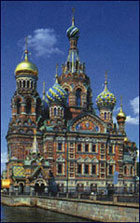
Last week NEW ladies
|
Thank you for the time you've taken to put together a good 'Reality Check' for all the nonsense currently surrounding the notion of a Russian wife. While I think that many American men may be attracted to the fantasy of the Perfect Russian Bride (beautiful, young, easy and eager to please), your essays made clear the simple and wonderful truth: Russian women are human beings, with all the glory and tragedy that comes with that condition. Mark W., USA I just wanted to say thanks for your help with the Starter package and advertisements. I was shocked, but since my ad was published yesterday, I have received 22 replies already... Eric (USA) |
| Home | Who Am I | Myths and Reality | FAQ | About Russia |
| Russian Women Secrets | Services and Prices | Add URL | Links |
The Mariinsky Theatre
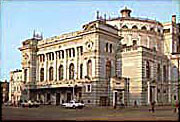 The Mariinsky Theatre was founded in 1783 following a decree by Empress Catherine the Great to stage the first Russian comic operas and the best works by foreign composers.
The current theatre was built on a site that had been a circus, opposite the Italian Bolshoi Theatre in Carousel Square. Today this area is known as Theatre Square, and the Italian opera house has long ago made way for the famous St. Petersburg Conservatory, named after Rimsky-Korsakov who taught there for nearly 40 years.Designed by the architect Caves, the theatre, opened in 1860, was named for Maria, wife of the reigning Tsar Alexander II.Known during the Soviet era as the Kirov, after a Russian revolutionary leader, the theatre has regained its original imperial title: the Mariinsky.The opening of the Mariinsky Theatre heralded a golden period in St Petersburg's operatic history. There, in 1862, Verdi's La forza del destino received its world premiere, in the presence of the composer. Many Western works, translated into Russian,
quickly found their way onto the Mariinsky stage and, at the same time, the flourishing of Russian opera led to the premieres of such national masterpieces as Boris Godunov (1874), Prince lgor (1890), and The Queen of Spades (1890).
The Mariinsky Theatre was founded in 1783 following a decree by Empress Catherine the Great to stage the first Russian comic operas and the best works by foreign composers.
The current theatre was built on a site that had been a circus, opposite the Italian Bolshoi Theatre in Carousel Square. Today this area is known as Theatre Square, and the Italian opera house has long ago made way for the famous St. Petersburg Conservatory, named after Rimsky-Korsakov who taught there for nearly 40 years.Designed by the architect Caves, the theatre, opened in 1860, was named for Maria, wife of the reigning Tsar Alexander II.Known during the Soviet era as the Kirov, after a Russian revolutionary leader, the theatre has regained its original imperial title: the Mariinsky.The opening of the Mariinsky Theatre heralded a golden period in St Petersburg's operatic history. There, in 1862, Verdi's La forza del destino received its world premiere, in the presence of the composer. Many Western works, translated into Russian,
quickly found their way onto the Mariinsky stage and, at the same time, the flourishing of Russian opera led to the premieres of such national masterpieces as Boris Godunov (1874), Prince lgor (1890), and The Queen of Spades (1890).
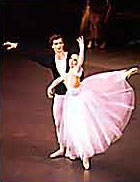 In 1869 the Czech-born conductor Eduard Napravnik became chief conductor, a post he held until his death 47 years later. During this period he conducted almost all the premieres in the Mariiinsky and raised it to a position among the world's leading opera houses. Western composers such as Wagner, Mahler amd Berlioz came to the theatre, and sections of The Ring and Tristan were performed by the Mariinsky's orchestra before they were heard in Bayreuth. At this time, the ballet was equally distinguished under its director Marius Petipa. In the 1890s its premieres of Sleeping Beauty, Swan Lake, and Raymonda influenced the development of classical dance.
In 1869 the Czech-born conductor Eduard Napravnik became chief conductor, a post he held until his death 47 years later. During this period he conducted almost all the premieres in the Mariiinsky and raised it to a position among the world's leading opera houses. Western composers such as Wagner, Mahler amd Berlioz came to the theatre, and sections of The Ring and Tristan were performed by the Mariinsky's orchestra before they were heard in Bayreuth. At this time, the ballet was equally distinguished under its director Marius Petipa. In the 1890s its premieres of Sleeping Beauty, Swan Lake, and Raymonda influenced the development of classical dance.
At the beginning of this century such legendary artists as Chaliapin, Pavlova and Nijinsky performed at the theatre, and productions were designed by Russia's leading artists, including Korovin, Golovin, Bakst, Benois and Vasnetsov. During the I920s the young Soviet regime was still open to new artistic developments: in 1927 Wozzeck was performed at the State Academic Theatre (as the Mariinsky was then known), 25 yeats before its British premiere at Covent Garden. In recent years, foreign tours have brought both the Kirov Opera and Ballet to international recognition and acclaim.
In 1988 Valery Gergiev was appointed Artistic Director of the Kirov Opera. In his first season the theatre presented a festival of five Musorgsky operas, including Khovanshchina, which was televised throughout the Soviet Union and Europe. Part of this series was taken to the Edinburgh International Festival in 1991.
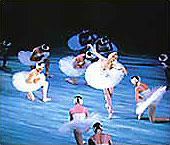 The theatre celebrated Prokofiev's centenary in 1991 with new productions of The Gambler, War and Peace (broadcast live to Britain by the BBC), Love for Three Oranges, and Fiery Angel. In February 1994 the Kirov Opera commemorated the 150th anniversary ofRimsky-Korsakov s birth with a festival of concerts, the operas Sadko, Maid of Pskov, Kashchei the Immortal, and The Legend of the Invisible City of Kitezh.
The theatre celebrated Prokofiev's centenary in 1991 with new productions of The Gambler, War and Peace (broadcast live to Britain by the BBC), Love for Three Oranges, and Fiery Angel. In February 1994 the Kirov Opera commemorated the 150th anniversary ofRimsky-Korsakov s birth with a festival of concerts, the operas Sadko, Maid of Pskov, Kashchei the Immortal, and The Legend of the Invisible City of Kitezh.
In April 1990 Gergiev and the Kirov Opera presented Andrei Tarkovsky's Boris Godunov, originally created for Covent Garden. The live broadcast to Britain from the Mariinsky Theatre was the first transmission of its kind from St Petersburg. In April 1992 the Kirov Opera and Ballet gave a gala at the Royal Opera House in the presence of HRH The Princess of Wales.
Entitled Welcome Back, St Petersburg, the gala was broadcast by the BBC and released on video. In recent years the Kirov Opera has toured worldwide, performing in England, Finland, France, Germany, Holland, Israel, Italy, Japan, Korea, Scotland, Spain and America. It made its US debut at the Metropolitan Opera House in 1992. Gergiev and the Mariinsky Orchestra have subsequently given two acclaimed American tours. The full Kirov Opera visited Japan for the first time in 1993, giving a series of concerts and stage performances of Fiery Angel, Boris Godunov, and The Queen of Spades. This autumn they return to Japan for an extensive orchestral tour. In 1994 the Kirov Opera made its Paris debut with a three-week residency at the Theatre des Champs-Elysees.
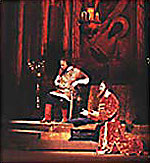 The company returns to the Champs-Elysees in February 1996 for performances of The Gambler and Prince lgor. Last year the Kirov Opera gave an acclaimed performance at the Barbican Hall, presented by Friends of the Kirov Opera, and last August they appeared at the Edinburgh lnternational Festival and Birmingham's Symphony Hall.
The company returns to the Champs-Elysees in February 1996 for performances of The Gambler and Prince lgor. Last year the Kirov Opera gave an acclaimed performance at the Barbican Hall, presented by Friends of the Kirov Opera, and last August they appeared at the Edinburgh lnternational Festival and Birmingham's Symphony Hall.
The Kirov Opera has an extensive recording schedule with Philips Classics, and releases so far include Khovanshchina, War and Peace, The Queen of Spades, Sadko, Prince lgor, and Fiery Angel. Future releases will include Iolanta, Ruslan and Ludmila, Maid of Pskov, Kashchei the Immortal, and Kitezh. Video releases include Khovanshchina, War and Peace, The Queen of Spades, and Sadko.
In 1992 Placido Domingo made his Kirov debut in Otello at the Santander Festival. This was repeated at the Mariinsky Theatre and broadcast on television throughout the CIS. Plans are being discussed for further performances by Domingo at the Mariinsky.
In St Petersburg, the Mariinsky Theatre is the centerpiece of the famous White Nights Festival, held annually during the last ten days of June. The 1995 festival included the Mariinsky Theatre's first production of Shostakovich's Katerina Izmailova, Aida in an historic production from La Scala, and a new Salome directed by June Taymor. The festival also paid tribute to the early Russian works of Igor Stravinsky, with new stagings of Mavra and and Le Rossignol and several concerts including Rite of Spring, The Firebird and Les Noces.
During the 1995-96 season, new productions will include Carmen with Olga Borodina and Mariss Jansons, Prokofiev's The Duenna, La forza del destino in Verdi's original version composed for the Mariinsky Theatre, The Gambler (a co-production with La Scala), and Prince Igor.
The 1996 White Nights Festival (June 20-30) will feature many of these new productions.
You can see also the official site of the Mariinsky Theatre

|
Russian Brides Cyber Guide7320 N Dreamy Draw DrivePhoenix, Arizona 85020 (602) 553-8178 FAX (602) 468-1119 Contact Us |
|
|
||